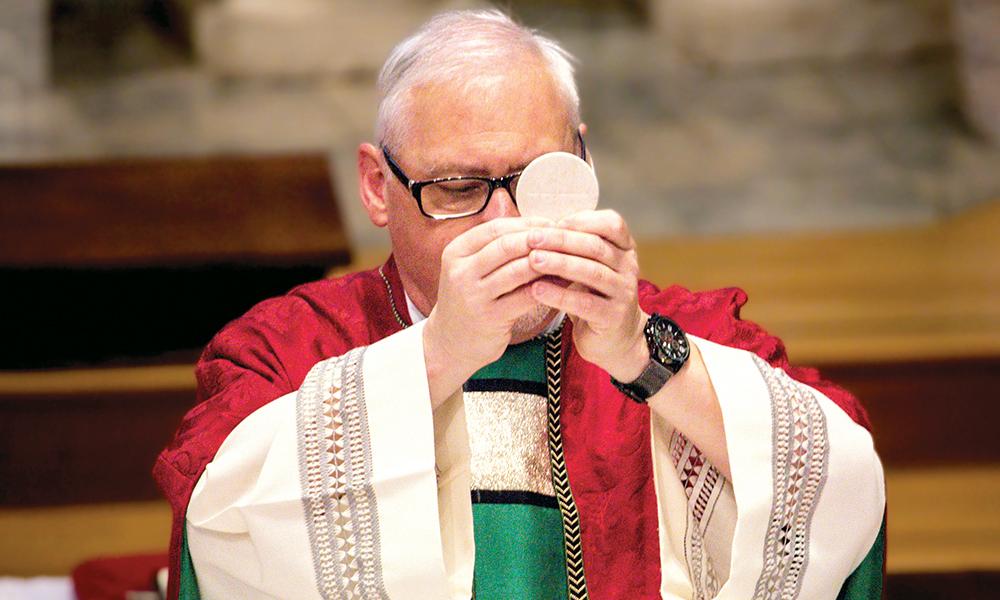
One Bread, One Body: The Many-Named Eucharist
We all know that Sunday is a special day, where we spend time with family, go for walks, visit our friends and do many other things. These are important; God created leisure after all. But within these good things we do on Sunday, there is one that is the most important. We dedicate time to God to thank him for all that he does by participating in holy Mass.
We all know that Sunday is a special day, where we spend time with family, go for walks, visit our friends and do many other things. These are important; God created leisure after all. But within these good things we do on Sunday, there is one that is the most important. We dedicate time to God to thank him for all that he does by participating in holy Mass.
In Pope Francis’ General Audience last June, he said, “May the Eucharist, mystery of love, be for all of us a source of grace and light that illuminates the paths of life, support in the midst of difficulties, consolation and sublime in the suffering of each day.” So, we should attend together to celebrate the holy Eucharist, which is known by several names:
- Eucharist. This is the source and summit of the whole Christian life, where we celebrate the sacrifice Jesus made by dying on the cross for each of us. The Catechism of the Catholic Church tells us, “Eucharist, because it is an action of thanksgiving to God. The Greek words because it is thanksgiving to God. The words eucharistein and eulogein recall the Jewish blessings that proclaim — especially during the meal — God’s works: creation, redemption, and sacrifice” (#1328).
- Banquet of the Lord. This refers to the Last Supper that Jesus celebrated with his disciples. At the same time, it is anticipation of the marriage feast of the Lamb in the heavenly Jerusalem, as the book of Revelation 19:9 tells us (CCC #1329).
- Breaking of bread. This is one of the ways mentioned in some passages of the Gospel. The first Christian communities called the rite of the Eucharist the breaking of bread (Acts 2:42). The Catechism says Jesus “used this rite, part of a Jewish meal, when as master of the table he blessed and distributed the bread, above all at the Last Supper. It is by this action that his disciples will recognize him after his resurrection” (#1329).
- Eucharistic Assembly (synaxis). This refers to what we celebrate in community with all our brothers and sisters, where the risen Christ is present and encourages us to relate to other communities in our Church. In Matthew's Gospel, he tells us, “For where two or three are gathered together in my name, there am I in the midst of them” (18:20).
- Memorial and Holy Sacrifice. This phrase is not just remembering what happened in the past, rather it is making present what happened 20 centuries ago. Pope Francis said that our participation in the Mass is entering into the passion, death, resurrection and ascension of Jesus. From this perspective, to go to Mass is to live in the same moment as Jesus lived it, the holy sacrifice — we owe our reverence and respect.
- Holy and Divine Liturgy. This term is used more in Eastern traditions. It is the center of ecclesial life, and at the same time it is the deepest expression of life. The Catechism tells us: “It is the mystery of Christ that the Church proclaims and celebrates in her liturgy so that the faithful may live from it and bear witness to it in the world” (#1068).
- Holy Communion. The moment when we receive the body and blood of Christ in the Eucharist, that is, the moment when we enter into a more intimate relationship with Jesus and the whole Church. “The principal fruit of receiving the Eucharist in holy communion is an intimate union with Christ Jesus” (CCC #1391).
- Holy Mass. In this celebration, the paschal sacrifice of Jesus Christ is renewed. It is called the “holy Mass” because the liturgy in which the mystery of salvation is realized ends with the sending of the faithful (missio) so that God's will may be fulfilled in our daily lives (CCC #1332).
We should not focus on prioritizing what we call or name the Eucharist. The most valuable thing is to participate and live this sacrament deeply in our lives. We remember that Jesus sacrificed himself for us for the atonement of our sins and continue to celebrate this divine sacrament in our time because of his command, “… do this in memory of me” (Lk 22:19).
Sister Guadalupe Flores, OLVM, is the Adult Faith Formation coordinator for the Hispanic Ministry office. Email gflores@charlestondiocese.org.
